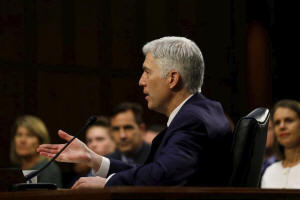|
Democratic opposition to U.S. high court
nominee grows
 Send a link to a friend
Send a link to a friend
 [March 25, 2017]
By Lawrence Hurley and Andrew Chung [March 25, 2017]
By Lawrence Hurley and Andrew Chung
WASHINGTON (Reuters) - A third of
Democratic senators have so far announced they will vote against
confirming U.S. President Donald Trump's Supreme Court nominee, adding
to a chorus of opposition from the left, but leaving questions over
whether there will be a concerted effort to block a vote in the Senate.
To date, 16 of the 48 Democratic senators have publicly backed their
leader, Chuck Schumer, who said on Thursday he opposes confirming
appeals court judge Neil Gorsuch. Others have yet to announce their
intentions.
Gorsuch is headed toward a Senate Judiciary Committee vote, likely on
April 3, on his nomination to the high court after a marathon four-day
confirmation hearing this week.
After that, it is not yet clear how much of a fight Democrats will put
up when the nomination is due for a final vote in the 100-member Senate,
where there are 52 Republicans.
The Democratic opposition to Gorsuch could prompt a showdown in the
Senate and delay the judge's confirmation but ultimately the Republicans
are likely to win that fight and avoid another setback in Congress for
Trump who suffered a blow on Friday when lawmakers pulled a major
healthcare bill.

Senate rules enable Democrats to insist on 60 votes to overcome a
procedural move called a filibuster to allow a final up-or-down vote on
confirming Gorsuch, 49, to the lifetime job on the nation's highest
court. (GRAPHIC - Confirming Gorsuch: How it works
http://tmsnrt.rs/2nANgEj)
But the Senate's Republican leadership could adopt a rule change
allowing a vote that would only require a simple majority of the
chamber. If eventually confirmed, Gorsuch would restore a conservative
majority on the nine-seat high court.
For Democrats, putting up a fight would at least frustrate Trump and
placate liberal activists sore about the Republican-led Senate’s refusal
to vote on President Barack Obama’s nominee to the same open seat on the
court last year.
If eventually confirmed, Gorsuch would restore a conservative majority
on the nine-seat high court.
DEMOCRATS TARGETED
Conservative activists were targeting ten Democrats running for
reelection in 2018 in states Trump won in the presidential election as
possible "yes" votes for Gorsuch among Democrats.
Of that number, Sherrod Brown of Ohio, Bob Casey of Pennsylvania and
Tammy Baldwin of Wisconsin have already announced their opposition to
the nomination. The other seven, including Joe Manchin of West Virginia,
have yet to announce their plans.
[to top of second column] |

Supreme Court nominee judge Neil Gorsuch testifies during the third
day of his Senate Judiciary Committee confirmation hearing on
Capitol Hill in Washington, U.S., March 22, 2017. REUTERS/Jonathan
Ernst

Another Democratic senator under pressure from both sides on Gorsuch
is Michael Bennet, who represents Gorsuch’s home state of Colorado.
Bennet has yet to announce his position.
Republicans are also hopeful that some Democratic members of the
judiciary committee, including Chris Coons of Delaware and Amy
Klobuchar of Minnesota, might be wary of blocking a vote on the
nominee. Their spokesmen did not respond to requests seeking
comment.
Don Stewart, a spokesman for Republican Senate Majority Leader Mitch
McConnell said it would be an "unprecedented, even nuclear step" to
require a 60-vote threshold before the Senate can vote on the
nominee.
"There has never, in the history of the Republic, ever been a
successful partisan filibuster of a Supreme Court nominee," he
added.
The last attempt to filibuster a nominee was a Democratic bid to
block a vote on Justice Samuel Alito, who was nominated by President
George W. Bush in 2005. Democrats failed to gather enough support
and the Senate voted 72-25 to proceed to an up-or-down vote. Alito
was eventually confirmed by 58-42.
Sarah Binder, a political scientist at George Washington University,
said Democrats may be able to gather enough support to block a vote
because so few of them are moderates from Republican-leaning states,
meaning they may feel they have little to lose. If Trump’s
popularity drops, that could embolden them further, she added.
(Reporting by Lawrence Hurley and Andrew Chung; Editing by Alistair
Bell)
[© 2017 Thomson Reuters. All rights
reserved.]
Copyright 2017 Reuters. All rights reserved. This material may not be published,
broadcast, rewritten or redistributed.
 |